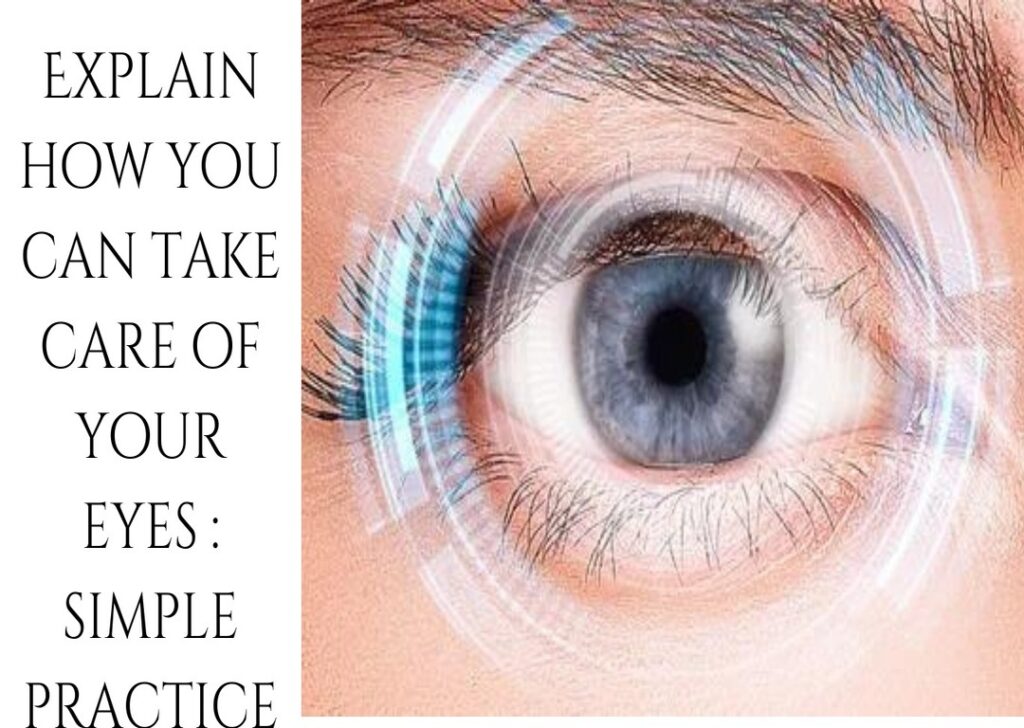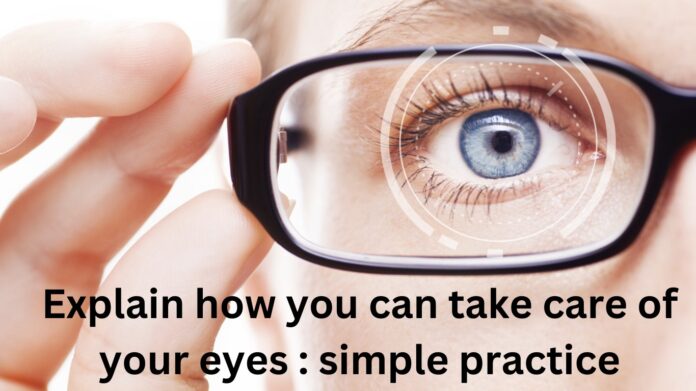Explain how you can take care of your eyes : simple practice, Eye care is crucial for maintaining overall health and quality of life. Our eyes are our windows to the world, allowing us to perceive and interpret our surroundings.
Good vision enhances daily activities, from reading and driving to recognizing faces and appreciating the beauty of nature. However, eye health is often taken for granted until problems arise. Neglecting eye care can lead to issues such as vision loss, eye strain, and diseases like glaucoma, cataracts, and macular degeneration.
By prioritizing eye health, we can ensure that our eyes function well throughout our lives, reducing the risk of vision problems and enhancing our overall well-being.

Natural Ways to Protect Your Eyes : Explain how you can take care of your eyes : simple practice
Eat a Balanced Diet: Nutrients such as omega-3 fatty acids, lutein, zinc, and vitamins C and E can help prevent age-related vision problems like macular degeneration and cataracts. Eating a diet rich in fruits, vegetables, and whole grains provides these essential nutrients. Leafy greens like spinach and kale, fish like salmon and tuna, and citrus fruits are particularly beneficial for eye health.
Stay Hydrated: Drinking plenty of water helps maintain the moisture balance in your eyes, preventing dryness and irritation. Proper hydration supports overall eye health and comfort.
Get Enough Sleep: Adequate sleep allows your eyes to rest, repair, and recover from daily strain. Lack of sleep can lead to eye fatigue, dryness, and discomfort, so aim for 7-8 hours of quality sleep each night.
Exercise Regularly: Physical activity improves blood circulation, which can benefit your eyes by ensuring they receive adequate oxygen and nutrients. Regular exercise also helps manage conditions like diabetes and high blood pressure that can adversely affect eye health.
Protect Your Eyes from the Sun: Wearing sunglasses that block 100% of UV-A and UV-B rays can protect your eyes from harmful ultraviolet light, reducing the risk of cataracts and macular degeneration. A wide-brimmed hat can also provide additional protection from the sun.
Quit Smoking: Smoking increases the risk of developing eye diseases.
Practice Good Hygiene: Avoid touching your eyes with unwashed hands to prevent infections.
Caring for Your Eyes as You Age : Explain how you can take care of your eyes : simple practice
As we age, our eyes become more susceptible to various conditions and diseases. Here are some tips to maintain eye health in later years:
Regular Eye Exams: Schedule comprehensive eye exams every 1-2 years, even if you don’t wear glasses or contact lenses. Regular check-ups can detect problems early, leading to better outcomes.
Monitor and Manage Chronic Conditions: Conditions such as diabetes and high blood pressure can affect eye health. Keeping these conditions under control through medication, diet, and lifestyle changes can prevent related eye complications.
Use Adequate Lighting: Ensure that your living and working spaces are well-lit to reduce eye strain. Use brighter lights for reading and detailed tasks.
Limit Screen Time: Prolonged screen exposure can cause digital eye strain.
Wear Corrective Lenses: If you need glasses or contact lenses, wear them as prescribed. Not using corrective lenses when needed can cause eye strain and headaches.
Stay Active: Regular exercise can help reduce the risk of age-related macular degeneration and other eye conditions by improving circulation and overall health.
Use Artificial Tears: If you experience dry eyes, over-the-counter artificial tears can help keep your eyes moist and comfortable. For persistent dryness, consult an eye care professional.
Seven Ways to Take Care of Your Eyes : Explain how you can take care of your eyes : simple practice
Eat a Healthy Diet: Incorporate foods rich in antioxidants, omega-3 fatty acids, and vitamins A, C, and E. Foods like carrots, fish, eggs, nuts, and leafy greens are particularly beneficial.
Protect Your Eyes from UV Rays: Wear sunglasses with UV protection and a hat with a brim to shield your eyes from the sun.
Maintain Good Hygiene: Wash your hands before touching your eyes or handling contact lenses. Avoid sharing makeup or personal eye care items.
Give Your Eyes a Break: Follow the 20-20-20 rule to reduce digital eye strain. Ensure your computer screen is positioned about an arm’s length away and slightly below eye level.
Keep Hydrated: Drink plenty of water throughout the day to maintain tear production and prevent dry eyes.
Exercise Regularly: Physical activity promotes healthy circulation and can help prevent conditions that affect eye health.
Avoid Smoking: Smoking increases the risk of eye diseases. Quitting smoking can significantly improve eye health and prevent damage.
Three Best Ways to Keep Your Eyes Healthy : Explain how you can take care of your eyes : simple practice
Regular Eye Exams: Explain how you can take care of your eyes : simple practice, Consistent check-ups with an eye care professional are essential for detecting early signs of eye diseases and maintaining overall eye health. Eye exams can identify conditions like glaucoma, macular degeneration, and diabetic retinopathy before they cause significant damage.
Proper Nutrition: Explain how you can take care of your eyes : simple practice, A diet rich in fruits, vegetables, and omega-3 fatty acids supports eye health. Nutrients like lutein, zeaxanthin, and vitamins C and E can protect against age-related eye diseases and improve overall vision health.
UV Protection: Explain how you can take care of your eyes : simple practice, Wearing sunglasses with 100% UV protection and a hat when outdoors shields your eyes from harmful ultraviolet rays. UV exposure can lead to cataracts and macular degeneration, so protecting your eyes from the sun is crucial.
Explain how you can take care of your eyes : simple practice, incorporating these practices into your daily routine enable us to maintain healthy eyes and prevent many common eye problems. Prioritizing eye health is essential for a lifetime of good vision and overall well-being.
Why is eye care important?
Eye care is crucial for maintaining good vision, preventing eye diseases, and ensuring overall eye health. It allows for early detection and treatment of conditions like glaucoma, cataracts, and macular degeneration, which can lead to vision loss if untreated.
How often should I get my eyes checked?
Adults should have a comprehensive eye exam every 1-2 years, even without vision problems. More frequent exams may be needed for those with risk factors such as diabetes or a family history of eye conditions.
What are the signs that I need to see an eye doctor?
You should see an eye doctor if you experience sudden vision changes, eye pain, frequent headaches, difficulty seeing at night, floaters, flashes of light, or eye redness and discharge.
How can I protect my eyes naturally?
Protect your eyes by eating a balanced diet rich in fruits, vegetables, and omega-3 fatty acids, staying hydrated, getting enough sleep, exercising regularly, wearing UV-protective sunglasses, quitting smoking, and practicing good hygiene.
What foods are good for eye health?
Foods that benefit eye health include leafy greens (spinach, kale), fish (salmon, tuna), eggs, nuts, seeds, citrus fruits (oranges, grapefruits), carrots, and sweet potatoes.
How can I reduce eye strain from screens?
To reduce digital eye strain, follow the 20-20-20 rule: every 20 minutes, look at something 20 feet away for at least 20 seconds. Ensure your screen is at eye level and arm’s length away, adjust lighting to reduce glare, and use artificial tears if needed.
Can exercise improve eye health?
Yes, regular exercise improves blood circulation, ensuring your eyes receive adequate oxygen and nutrients. It also helps manage conditions like diabetes and high blood pressure that can impact eye health.
How does aging affect eye health?
Aging can lead to presbyopia, increased risk of cataracts, glaucoma, macular degeneration, decreased tear production, and reduced peripheral vision. Regular eye exams and proper care can help manage these changes.
How can I prevent dry eyes?
Prevent dry eyes by staying hydrated, using a humidifier, taking breaks from prolonged tasks, using artificial tears, and avoiding exposure to smoke, wind, and dry air.
What should I do if I get something in my eye?
If you get something in your eye, do not rub it. Rinse with clean water or saline solution, blink to help remove the particle, and seek medical attention if the object doesn’t come out or you experience pain, redness, or vision changes.





[…] Taking care of your skin is an essential part of maintaining overall health and wellness, and nighttime is the perfect opportunity to focus on this. Your skin goes through a lot during the day—exposure to pollution, sun, makeup, and other environmental stressors can leave it looking tired and dull. A proper nighttime skincare routine can help repair the damage, rejuvenate your skin, and prepare it for the challenges of the next day. In this blog, we’ll explore the importance of a night skincare routine, provide tips to make it simple, and discuss the benefits of good skin health. […]
[…] and a compassionate approach, we can make it work. Here’s a comprehensive guide on how to care for elderly family members, manage your time effectively, and ensure their […]
[…] isn’t just a role; Happy Mother’s Day to all Mother’s, it’s a journey filled with immense challenges and sacrifices. From the moment of conception, a mother’s life […]